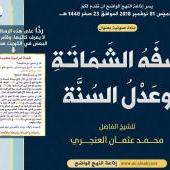The Foolishness of Getting Happy with other People's Problems and the Justice of the Sunnah
By: Shaikh Muhammad Al-Anjaree (hafithahullah)
I came across an article from an unknown author that is being spread by people known in Kuwait. It was spread to some students and Mashaikh in Kuwait.
I felt it is necessary to refute this, for what this article contains by way of oppression and transgression and spreading doubts about the manhaj of these two respected Shaikhs: the father, the respected Shaikh Rabee ibn Hadi and the brother, the respected Shaikh Muhammad bin Hadi.
This is because the writer of that article equated these two Shaikhs with Falih Al-Harbi.
As is found in the article in which this unknown author wrote when he was asked: “Who are your scholars?” - and he replied by accompanying Falih Al-Harbi along with these two noble Shaikhs.
This exposes the methodology of the writer of this article and those who spread it; and this is like mixing up the affairs - in order to deceive.
The writer and the spreader are trying to take advantage of the differing between the two Shaikhs: Shaikh Rabee and Shaikh Muhammad. So they are using this differing to try and equate these two Shaikhs with Falih Al-Harbi and cause doubts.
The manhaj of the People of Sunnah is the truth and there is no doubt about it nor does the Sunni be affected by any differing that occurs between some of the People of Sunnah.
Even if it reaches to the stage where some of them warn against each other or attack each other, we refute the one who is mistaken, no matter what level of being an Imaam they may have reached.
It is necessary to stick to the Foundations of the Sunnah, and from oppression is to equate the grievances that Ahlus-Sunnah might have between each other and compare them to ahlul-ahwa [people of desires & innovation].
It is from a despicable attribute of being happy because of other's problems and foolishness to use this differing between these two Shaikhs to create doubts about their manhaj.
This action of theirs resembles the action of the atheists, even though there is a difference, as the atheists seek to cause doubts about Islam. They use certain trials from the history of Islam, like that which occurred between the muslims, such as the fighting that occurred between them.
The Foundations of the Sunnah are the religion and the scholars and students of knowledge all make mistakes. As the Prophet sallallahualaihiwasallam said:
((All the children of Adam make mistakes and the best of those who make mistakes are those who repent.))
So a mistake is refuted no matter who made it or who it came from, while protecting and preserving their noble status and good history.
So we do not use a mistake from a scholar to cause doubt about his manhaj.
Nor do we associate the scholar with the people of desires. That would indeed be from oppression that Allah has prohibited.
There is a beneficial lesson from that which has preceded for those who contemplate and reflect:
When Imaam Ath-Thuhli (died 258 hijri) warned against Imaam Al-Bukhari (died 256 hijri).
Imaam Ath-Thuhli warned the people and the students against sitting with Imaam Al-Bukhari; however, the scholars and students of knowledge have not ceased to praise BOTH the Imaams: Ath-Thuhli and Al-Bukhari.
Even though Imaam Ath-Thuhli did what he did, the scholars of Ahlus Sunnah continue to praise BOTH those Imaams, rahimahumallah, continuously.
This is because there was no differing between those two Imaams regarding the Usoolus-Sunnah.
So this is the way that differing between Ahlus-Sunnah should be dealt with, as long as their foundations are one.
As long as their foundations are one, then the one who has made a mistake is told he is mistaken, whoever that may be. We say to him that “you are wrong in this” and that “you have made a mistake in this”.
The People of Sunnah do not have the misconception of the foolish ones who are happy about the problems of others.
We ask Allah to rectify the affair of Ahlus Sunnah, to remove the enmity between Ahlus-Sunnah, to join their hearts together, and gather them together upon the clear truth.
---
[Translated by: Abu Abdullaah Nabil Chogle]





